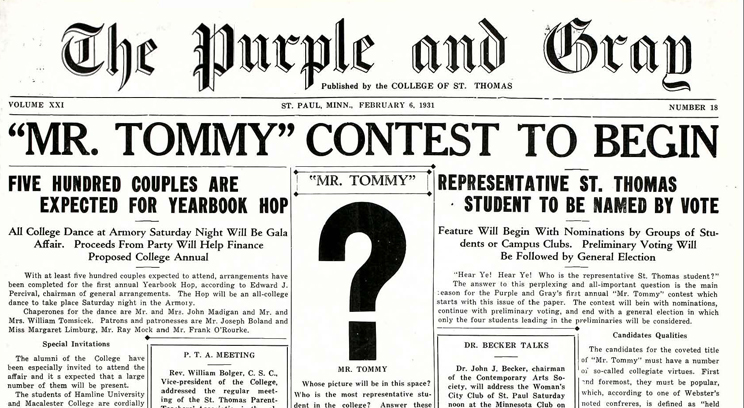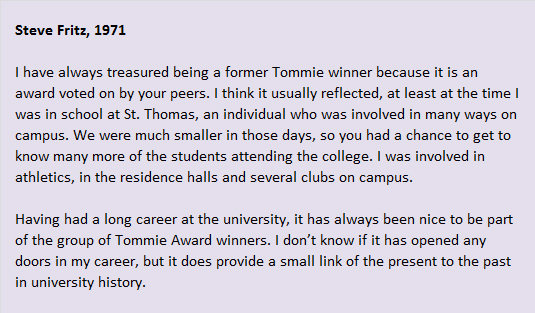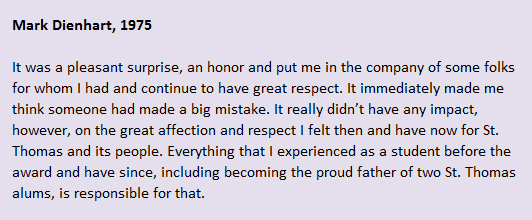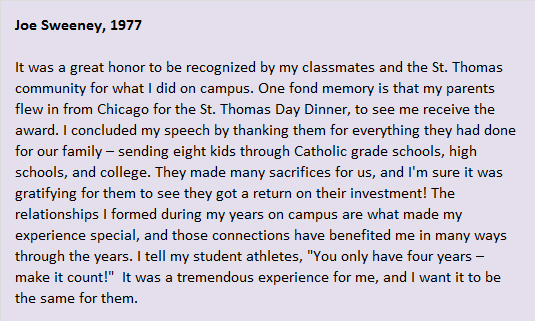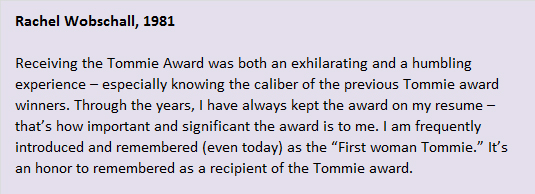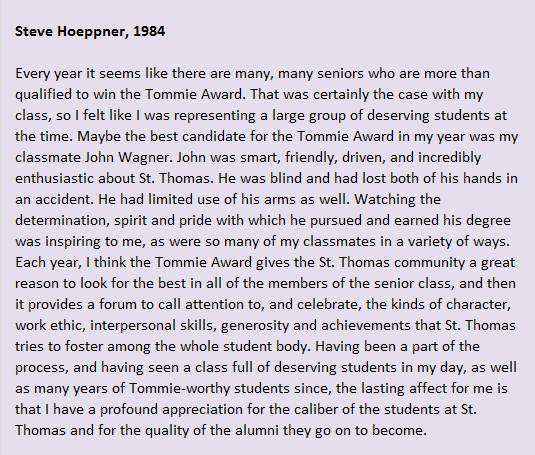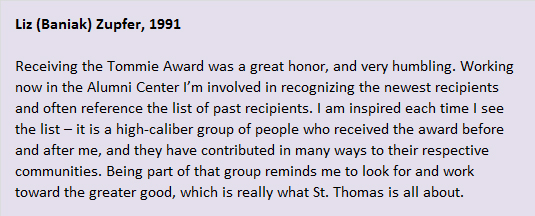The long purple and gray line
Webster defines “tradition” a half dozen different ways. At the University of St. Thomas, “Tommie Award” defines tradition. On Wednesday, May 8, the Tommie Award will be presented for the 81st time, to Eyo Ekpo, the latest in a long purple and gray line of the university’s best and brightest.
The award has been presented annually (with two exceptions) since 1931, when Ralph Antil edged classmate Don Pates by an 87-82 vote of their classmates. Awards were not given in 1945 and 1946 because of World War II and extremely small enrollments.
The award was titled Mr. Tommy in 1931, and later became the Tommy Award and still later the more gender-neutral Tommie Award.
In a 2007 St. Thomas magazine story, Pat Nemo and Marie Connor ’07 wrote that the “announcement was bold: The Mr. Tommy Award, vowed a 1931 Purple and Gray story, ‘promises to be the biggest event of its kind in the history of the school.’ Hyperbole aside, the College of St. Thomas student newspaper (and predecessor of The Aquin) thought it had hit on a winner in the spring of 1931: a contest to name ‘the representative St. Thomas student’ based on ‘popularity, scholastic standing and extracurricular activity.’”
Voting procedures and criteria for winning have changed somewhat over the years along with the name, but the heart of the award remains unchanged since its inception – recognition of the St. Thomas “senior who, according to UST students, faculty and staff, best represents the ideals of St. Thomas Aquinas through scholarship, leadership and campus involvement.”
In the beginning
The award was initiated in the early years of the Great Depression. According to Joseph B. Connors, author of Journey Toward Fulfillment, a history of the College of St. Thomas, times were tough on campus in the early ’30s.
The stock market had crashed in late 1929, bringing on the Great Depression. On campus, the old Administration Building had been condemned (again) by city inspectors, who gave the administration a month to vacate the building. Archbishop Austin Dowling, chair of the college’s Board of Trustees, died Nov. 29, 1930. “It was to be more than a year before a new archbishop would arrive to take over direction of the St. Paul archdiocese,” Connors wrote.
But as Connors pointed out, “Paradoxically, it was a period of accomplishment.” The trustees voted to build a new administration building and a classroom building. Enrollment, which had been 490 in 1930, jumped to nearly 650 in 1931.
Connors continued:
Despite the bleakness of the times, morale throughout the student body was good. The students generally felt confident that the school was advancing academically. They seemed, too, to have felt an increased sense of being part of a distinctive collegiate community. The academic year of 1930-31 brought the first strictly collegiate yearbook, the Aquinas. Within that same year, an important campus tradition was started with the election of the first “Mr. Tommy,” a student chosen by the student body as an embodiment of qualities held in special esteem at the College. The first person to bear the title was Ralph Antil, of Maple Lake, Minnesota, a campus leader who had maintained a high scholastic average while starring in football and basketball and being captain of the 1930-31 teams in both sports.
Tommy firsts
Antil was the first Mr. Tommy, but other historical “firsts” also have been recorded.
1935
This year marked the first time that two students – Bernard Van Demark and Frank Haider – shared the award. A tie vote was recorded again in 1943 when James B. Gergen and Eugene C. Neitge shared the award.
1947
Norbert Robertson was the recipient of the Mr. Tommy Award, but times were different back then. “He was the first Tommie to be married with a child,” said Gwen, Robertson’s wife of 60 years. “It was war time and the war was just over.”
1958
Charles Williams Jr. never paid much attention to being first black award winner. “I understand that I was the first black student to win the Mr. Tommy Award,” he said, “but I never paid much attention to that. I was just a member of the student body and there was no emphasis on black students on campus, though St. Thomas always welcomed students of color. Being named the outstanding senior affected my life by reinforcing the sound moral and personal values instilled in me by my parents.”
1981
Rachel Wobschall, from Waseca, Minn., became the first woman in the award’s 51-year history to win it. It was named the Tommy Award at that point. Today, Wobschall is the executive director of Alumni and Constituent Relations. Interviewed in 1981 by Anne Etzell in The Aquin, the student newspaper at the time, Wobschall said, "I didn't know until the day of preliminary voting that I was up for the award. It's the highest honor I could imagine. I was so surprised.”
Wobschall was highly involved on campus. She was president of the All College Council (ACC), a member of the President's Student Development Council, Spanish Club, Liturgical Choir, the Alcohol and Drug Education Committee and Advisory Council on Religious Affairs; in addition, she was a former ACC vice president for academic affairs and was class representative her freshman and sophomore years.
1982
One year later, William Vouk, from St. Stephen, Minn., became the first St. John Vianney Seminary student to win the award. The Aquin reported that he was majoring in philosophy, was a tutor-teaching assistant with the St. Thomas’ Philosophy Department, and a member and former chairman of the Pro-Life Subcommittee of the St. John Vianney Apostolic Life Committee, coordinator of the seminary's Christian Children's Fund, and a member of the CST Democrats.
Aquin staff writer Lou Anne Coyle wrote that Vouk said that as a Tommy Award winner he was “‘very atypical. It's kind of a fluke that I won. It's still a surprise, especially since the rest of the guys (the other three finalists) were such great guys.’ Vouk said the seminarians were very supportive and wanted to get ‘one of their own’ elected. He said he feels that the Tommy Award represents the model St. Thomas student.”
Tommies of note
Following graduation, Tommie Award winners sometimes remain on campus or come back to campus. Six award winners are employed by St. Thomas:
- Steve Fritz '71, director of athletics
- Mark Dienhart '75, executive vice president and chief operating officer
- Joe Sweeney '77, head coach, women's cross country, and track and field programs
- Rachel Wobschall, '81, executive director, Alumni and Constituent Relations
- Steve Hoeppner '84, executive director, Development
- Elizabeth (Baniak) Zupfer '91, manager, alumni systems, Alumni and Constituent Relations
Through the accompanying purple-tinted sidebars, they have shared their thoughts on what it has meant to them to have won the Tommie Award.
If one reads through the entire list of 82 award winners, and soon to be 83 with the addition of Eyo Ekpo, you likely will recognize many who were prominent members of the community in the years following their final march through the Arches. Three of those Tommies are highlighted here:
1937 E. Harvey O’Phelan, M.D.
A former member of the board of trustees at St. Thomas, Harvey O’Phelan served for many years as a doctor to the Minnesota Twins. He often patched up St. Thomas athletes, even going to Cuba with the baseball team in 2000. Two sons, Sean and Edward, graduated from St. Thomas in the 1970s, as did his father, James, in 1906.
1941 James Shannon
The straight-A student graduated in three years with a major in Latin, was ordained a priest and, at age 35, became president of St. Thomas. He served from 1956 to 1966. Pope Paul VI named Shannon a bishop and he served until 1969, when he left active ministry. He later married and served in the administration at St. John’s College in Santa Fe, N.M., before returning to the Twin Cities as president of the Minneapolis Foundation and then the General Mills Foundation.
1955 Francis Mach
Director of athletics at St. Thomas from 1968 to 1992, Mach said his “most gratifying accomplishment was playing a significant role in re-establishing the men’s athletic program to prominence in the MIAC, and the rare opportunity to start an athletics program for women and watch it prosper.” What he liked most about St. Thomas were his fellow students: “The many friends were unpretentious, serious about studies and fun loving.” Three Mach children graduated from St. Thomas.
Back to the future
Thomas Carlyle, a Scottish, essayist, historian, teacher and social commentator, may have been right when he said: “History is the essence of innumerable biographies."
The University of St. Thomas has been blessed to have had “innumerable biographies” since its founding in 1885 by Archbishop John Ireland, and among them have been numerous Tommie Award winners.
If Tommie history is any indication of the future, generations of Tommie Award winners will continue to be outstanding student leaders and citizens who will uphold the “ideals of St. Thomas Aquinas through scholarship, leadership, and campus involvement.”
